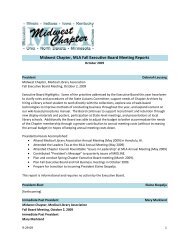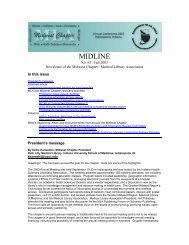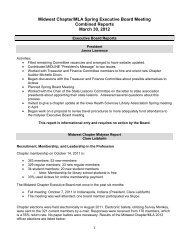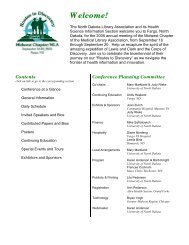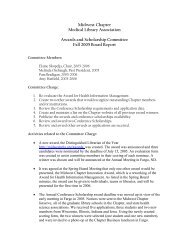full conference program - Midwest Chapter MLA
full conference program - Midwest Chapter MLA
full conference program - Midwest Chapter MLA
Create successful ePaper yourself
Turn your PDF publications into a flip-book with our unique Google optimized e-Paper software.
articles, data, and research that the MD/PhD journal club members would review, discuss and dissect over the ten<br />
weeks of meetings.<br />
Over the summer, we learned how different the physician-scientist student experience is from that of the clinical<br />
medical student experience. Their needs, not only of us, but also of the literature and statistics are inherently dissimilar.<br />
However, their goals are ultimately the same -- to improve the health and outcome of the patient.<br />
This paper will describe our Physician-Scientist Journal Club experience, the insights this opportunity provided into the<br />
user perspective, and how we approached being “experts” for another journal club session in 2012.<br />
Sunday, October 7 th , Session 2<br />
2:05-2:20 Elliott Suite<br />
Community Disaster Preparedness: An Opportunity for Hospital Libraries<br />
Author: Amy Donahue, MLIS, AHIP, Medical Librarian/Informationist, Aurora Health Care - Aurora Medical Center<br />
Grafton, Grafton, WI<br />
On May 5th, 2012, the Health Care Partners of Ozaukee County (including the author, a hospital librarian), along with<br />
several other community partners, held a “Community Preparedness Day” at a local public library. The event had been<br />
in the works since October 2011, when the project received a Community Preparedness Award from the NN/LM Greater<br />
<strong>Midwest</strong> Region. The formal aim of the project was to organize a county-wide event where Ozaukee County<br />
(Wisconsin) residents would learn about creating emergency plans and kits and about various emergency/disaster<br />
resources. In addition, residents would be able to connect with local emergency and disaster organizations. (Attendees<br />
at the event also went home with a number of key components of emergency kits, which were purchased with funds<br />
from the NN/LM award.) A second, equally important goal was to provide an opportunity for the partner organizations<br />
to work together in a non-emergency situation, strengthening the partnership and providing an opportunity for<br />
increased visibility. With the event drawing over 70 area families (an estimated 150 individuals), the project was<br />
considered a success and there are plans for similar events in the future.<br />
The purpose of this presentation is to describe the entire process of the project, from identifying the need and applying<br />
for the NN/LM award to planning and evaluating the event. Specific areas that will be covered include developing<br />
partnerships, marketing, sustainability, lessons learned, etc. Medical librarians will come away with valuable<br />
information for moving ahead with their own projects in the future.<br />
(This project has been funded in whole or in part with Federal Funds from the National Library of Medicine, National<br />
Institutes of Health, Department of Health and Human services, under Contract No. HHSN-276-2011-00005C with the<br />
University of Illinois at Chicago.)<br />
2:20-2:35 Elliott Suite<br />
Investigating and Improving Medical Education and Library Resources at the Tamale Teaching Hospital in Northern<br />
Ghana: A Case Report<br />
Author: John Chenault, Assistant Professor, Kornhauser Health Sciences Library, University of Louisville<br />
My paper discusses a service-learning trip I took in the summer of 2011 to conduct a series of consultations and<br />
workshops for librarians, administrators, faculty, and students at Tamale Teaching Hospital (TTH) and the University of<br />
Development Studies (UDS) in Northern Ghana. The visit was organized in support of a series of service <strong>program</strong>s and<br />
collaborations that have been ongoing for several years between the University of Louisville (U of L) School of Public<br />
Health and Information Science (SPHIS) and TTH and UDS. The goal of the visit was twofold: to provide a series of<br />
training workshops to improve the research, database, and digital skills of clinicians, faculty, and students; and to



